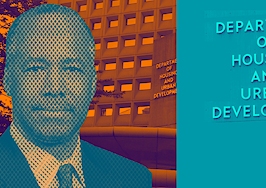The real estate industry and real estate agents have been directly involved in perpetuating housing discrimination, according to Lisa Rice, the president and CEO of the National Fair Housing Alliance (NFHA) and Bill Dedman, an investigative reporter for the Long Island-based newspaper Newsday.
Speaking with Susan Daimler, Zillow’s senior vice president of Premier Agent, during Zillow’s virtual Unlock conference, the two highlighted specific instances of housing discrimination that they’ve investigated and what agents and leaders in the real estate industry can do to put an end to it.
“The [Fair Housing Act] violations came not just in what the agents said, but more in what the agents did,” Dedman said, highlighting the work he and his team did in a groundbreaking report on housing discrimination.
“Real estate agents gave unequal treatment in 40 percent of our tests,” he said.
The report uncovered multiple instances of discriminatory practices after testing nearly 100 real estate agents and secretly recording hundreds of hours of conversations while looking at the listings of more than 5,000 homes. In many cases, agents were accused of “steering,” an action that guides buyers or sellers to certain areas based on their race or ethnicity.
A lot of the steering was based on school district, according to Dedman. And what struck he and his team was how frequently the agents investigated would lead with steering or coded violations of the Fair Housing Act.
“This was the sales pitch,” Dedman said. “It seems as though the agents were including steering as a big part of the service they were selling.”
It wasn’t just steering, but also instances where agents wouldn’t work with Black or Latinx homebuyers if they weren’t pre-approved. That wasn’t the case when Newsday sent white testers. Non-white testers were subject to much more financial scrutiny, according to Dedman.
When Rice first read the Newsday report, the biggest thing that shocked her was how little things had changed since her organization conducted a similar investigation roughly a decade ago. NFHA’s investigation was a multicity, multiyear look at real estate sales.
“As I sit and listen to [Dedman] describe the findings and study they did, and as I was watching the videos and reading the report on Long Island: Divided, what really struck me is that this is not a new problem,” Rice said. “What really struck me was how little we had progressed in that 10 year time.”
NFHA’s multiyear, multicity investigation found that Black and Latinx homebuyers were not called back by real estate agents and were steered towards traditionally Black and Latinx neighborhoods. The investigation found that those individuals were steered by a real estate agent 87 percent of the time.
In one suburb of Atlanta, the study’s Black testers were not shown a single house in a particular neighborhood, while the white testers were shown nearly two dozen in that neighborhood.
In many cases, the agents used coded language, so it didn’t appear an outright violation of the Fair Housing Act. When referencing Black or Latinx neighborhoods, the agent would cite crime statistics. Conversely, when talking about White neighborhoods, the agent would mention that the neighborhood was, “safe,” Rice said.
The investigation also found that Black and Latinx homebuyers were not given the same amount of information as their white counterparts.
“They had to meet higher thresholds just to get shown a house,” Rice said.
The discussion was also centered on steps that real estate agents and leaders can take to put an end to housing discrimination from within the real estate industry.
Rice said real estate brokerages need to think about diversity, not only in its agents but also in management. Brokerages should also consider opening offices outside of traditionally white communities, which is common, according to Rice.
Brokerages also need to actively support Fair Housing laws and compliance around those laws. The state-mandated trainings, in many places, are not sufficient enough, Dedman said, so it’s incumbent upon brokerages to take it upon themselves and teach agents, and even do some of their own testings.
“I would encourage people operating real estate companies and offices to put less emphasis on the provocative, impossible to answer questions like, ‘Who has bias in their heart? And who thinks in a racist manner?,'” Dedman said. “Put more of your attention on: How do we treat everybody the same?”
“The way to stop steering is to stop steering,” Dedman said. “Treat everybody the same.”






